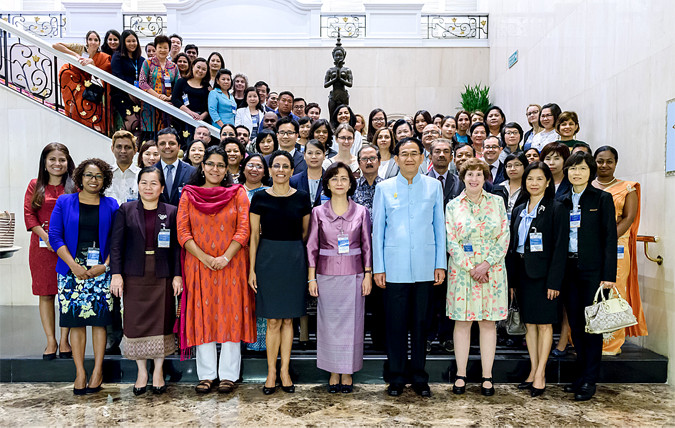UN Women launches a report on Budget Call Circulars and Gender Budget Statements in the Asia Pacific
Date:
[Press Release]
Bangkok, Thailand - Senior representatives from the Ministries of Finance and National Women Machineries from 20 countries across the Asia Pacific region gathered today to launch a report on ‘Budget Call Circulars and Gender Budget Statements in the Asia Pacific’ published by UN Women

Achieving gender equality is fundamental to realizing the transformative promise of the historic 2030 Agenda and its Sustainable Development Goals, adopted by 193 Head of States at the 70th United Nations General Assembly in New York this September. The Member States also agreed upon the Addis Ababa Action Agenda, the main outcome of the Third International Conference on Financing for Development, which will be fundamental to the implementation of the post 2015 development framework. This year also celebrated the 20 year anniversary of the Beijing Declaration and Platform for Action, the most progressive blueprint for advancing women’s rights.
Despite significant advancements on the commitments made by countries worldwide, deep financing gaps for women and girls continue to pose significant barriers to rapid progress. Following the adoption of the Beijing Platform of Action in 1995, a number of countries adopted gender responsive budgeting (GRB) as a key strategy to advance women’s rights.
More than 90 countries have engaged in gender-responsive budgeting worldwide, of which more than a quarter are found in the Asia Pacific region. In fact, Asia Pacific Region is home to some of the earliest and most innovative strategies of GRB. Of the wide range of GRB tools, gender budget statements and budget call circulars are the most popular strategies in the region.
The report published by UN Women collates experiences from 17 countries across the Asia Pacific Region to document the ways in which these two critical financial accountability tools have been adopted in different countries.
“Budget Call Circulars and Gender Budget Statements offer exciting possibilities. However, their true potential will only be realised when those outside government chambers including civil society and women’s rights organizations use these tools to inform public debate and discussion,” said Ms. Roberta Clarke, Regional Director,
UN Women Asia and the Pacific and Representative in Thailand.
Ms. Debbie Budlender, the author of the report highlights that the tools have certainly ‘facilitated gender-responsive changes in budget decision-making processes’.
She concludes that gender budget statements and inclusion of gender in budget call circulars have led to include greater awareness of gender equality and how that might be reflected in policies, budget and implementation. Another important outcome of many of these initiatives is improvement in availability of data which is critical to gender responsive planning and implementation of policies and programmes.
UN Women offers this report as a resource for gender equality advocates both within and outside the government committed to the agenda of greater accountability for gender equality commitments.
Media Inquiries:
Yamini Mishra,
Gender Responsive Budgeting Specialist,
Email: [ Click to reveal ]
Lalita Intasean,
Programme Officer,
Email: [ Click to reveal ]
Montira Narkvichien,
Regional Communications Specialist,
Email: montira.narkvichien@unwomen.org